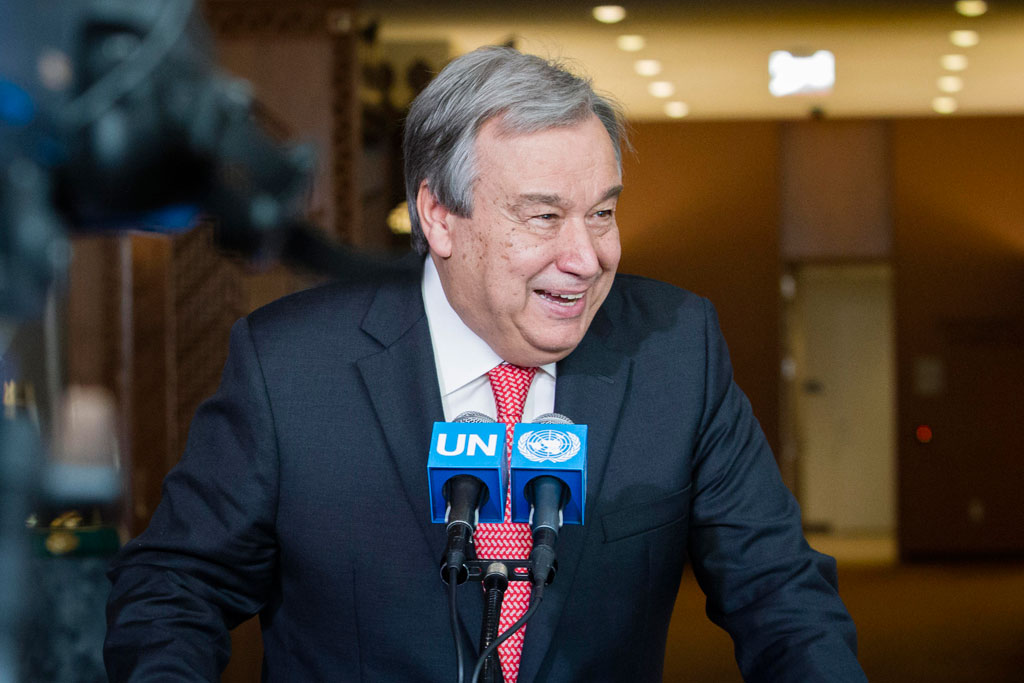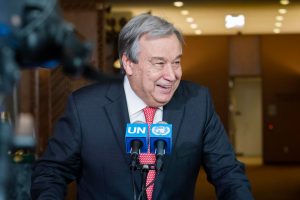1ST MEETING (AM)
Secretary-General Recounts Portugal’s ‘Totally Absurd’ Colonial Past, while Commending Efforts of Special Committee on Decolonization
Panel Also Elects Chair, Approves Tentative Programme of Work for 2017 Session
Opening its work this morning with a highly personal address by Secretary-General António Guterres, the Special Committee on Decolonization also voted to elect Rafael Darío Ramírez Carreño (Venezuela) as Chair of its 2017 session.
Secretary-General Guterres, recalling his youth spent living under the oppressive dictatorship of António de Oliveira Salazar in Portugal, said he had closely followed the work of the Committee, formally known as the Special Committee on the Situation with Regard to the Implementation of the Declaration on the Granting of Independence to Colonial Countries and Peoples.
“You can imagine how I feel today,” being able to address the body that was so strongly linked to the struggles and dreams of his youth, as well as to those of many other democratic-minded Portuguese people of his generation, he said. The Salazar regime had oppressed his own country, as well as its sisters and brothers around the world with a “totally absurd” colonial policy, leading to bloody and terrible wars in Angola, Mozambique and Guinea Bissau. However, as the Portuguese army had gradually grown tired of fighting wars without political solutions, independence had come — “late, but finally” — to the former Portuguese colonies.
Expressing his deep commitment to the United Nations decolonization agenda as one of its defining mandates, he recalled that the Organization had had only 110 Member States when the Special Committee began its work in 1962. That number had now risen to 193, representing the success of decolonization. However, the process was not yet finished, as 17 Non-Self-Governing Territories remained. “We must unite our strengths to complete this historic task,” he stressed, noting that the process would require proactive and sustained engagement by the Committee, the administering Powers, the Non-Self-Governing Territories themselves and other stakeholders.
Following that address, the Special Committee held a secret ballot vote by which it elected Rafael Darío Ramírez Carreño (Venezuela) as Chair of its 2017 session. Out of 29 total ballots, including 1 abstention, Mr. Ramírez Carreño received 18 votes. The other candidate, Walton Alfonso Webson (Antigua and Barbuda), received 10 votes.
“This body continues to be committed to seeking innovative solutions to fulfil its mandate,” said Mr. Ramírez Carreño as he took his place at the podium. Recalling that the General Assembly annually reiterated its conviction of the need for the eradication of colonialism, he said that, nevertheless, that process remained incomplete.
“My capacity as Chairman prevents me from remaining neutral in the eradication of colonialism,” he said, adding that “we are, and will always be, in favour of the cause of self-determination”. The Special Committee had always acted in strict compliance with General Assembly resolutions and the United Nations legal opinions, within the framework of respect, tolerance and adherence to its practices and working methods, including consensus in decision-making, unity, objectivity and non-divisiveness.
Reviewing the Special Committee’s activities and achievements during its 2016 session, he said the body bore an important responsibility to the 17 Non‑Self-Governing Territories and with the issue of Puerto Rico, which had been on its agenda for over four decades. “The people of these Territories expect that the Committee makes firm and timely decisions […] so they can freely exert, where applicable, their right to self-determination and independence,” he said.
In other business, the Special Committee approved the tentative programme of work and timetable for its 2017 session, contained in a note by the Chair (document A/AC.109/2017/L.2).
Acting by acclamation, it also elected three Vice-Chairs — Anayansi Rodríguez Camejo (Cuba), Dian Triansyah Djani (Indonesia) and Adikalie Foday Sumah (Sierra Leone) — for its 2017 session, as well as Bashar Ja’afari (Syria) as Rapporteur.
The Chair also expressed condolences to the Permanent Mission and people of the Russian Federation on the recent death of its Permanent Representative to the United Nations, Vitaly I. Churkin.

